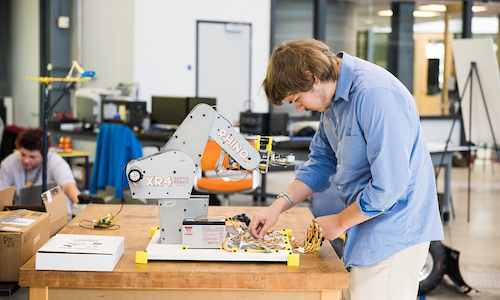Four doctoral degree programs are set to debut in Fall 2017 in the College of Engineering and Computer Science (CECS) at University of Michigan-Dearborn.
They are in computer and information science (CIS); electrical and computer engineering (ECE); industrial systems engineering (ISE); and mechanical sciences and engineering (MSE).
All four programs are accepting applicants for the 2017-2018 academic year.
“The new programs were designed in response to industry’s strong demand both for highly qualified engineers in research and development, and for the products of research undertaken by Ph.D. students,” said Tony England, dean, CECS.
Students will conduct research with faculty involved in innovative translational research and original fundamental research in broad areas of engineering and computer science.
To support the research, the recently approved $90 million Engineering Lab Building will provide modern research spaces, flexible learning and lab areas, and opportunities for industry research and community outreach when completed.
The programs require completion of course work, qualifying and preliminary exams, and the successful final defense of the dissertation. Additionally, the CIS, ECE and MSE programs are designed to allow students to complete a related master’s degree concurrently with doctoral course work.
All students admitted for full-time study will receive a competitive financial aid package in the form of an appointment as a graduate student instructor (GSI) or research assistant (GSRA).
The programs are:
- Ph.D. in Computer and Information Science. This is a research-oriented degree program designed to address the growing needs of industries and organizations for engineering professionals with advanced knowledge, technical skills and abilities to conduct high quality applied research in computer and information science. It offers concentrations in data management, data science, systems and security, and software engineering, each important to industries and organizations. The doctorate degree will be offered to quality students who have completed, with distinction, either a bachelor’s degree or a master’s degree in computer science or a closely related field.
- Ph.D. in Electrical and Computer Engineering. This research-oriented degree is designed to address the growing needs of industries and organizations for engineering professionals with advanced knowledge, technical skills and abilities to conduct high quality applied research in electrical and computer engineering. This interdisciplinary effort brings together the two broad disciplines of electrical and computer engineering. The program is designed to train students to conduct research and develop innovative technologies. The primary objective is to prepare future R&D leaders of industry. Four core program areas are: Computer Systems and Networks; Control Systems and Signal Processing; Electronics, Optoelectronics, Power and Energy Systems; and Intelligent Systems and Robotics. The degree will be offered to quality students who have completed, with distinction, either a bachelor’s degree or a master’s degree in electrical or computer engineering or a closely related field.
- Ph.D. in Industrial Systems and Engineering. This is a research-oriented degree designed to address the growing needs of industries for engineering professionals with advanced knowledge, technical skills and abilities to conduct high quality research in industrial and systems engineering. The program offers concentrations in integrated design and manufacturing, decision science and operations research, and human factors and ergonomics. The degree is offered to exceptional students who have completed, with distinction, a master’s degree in engineering, or a closely related field.
- Ph.D. in Mechanical Sciences and Engineering. This program educates and trains talented students who will conduct original and innovative research in the engineering field, educate future generations, and play leading roles in developing cutting edge technologies while working in industry, academia and government. The doctoral program has a strong orientation toward the interfaces between the science of mechanical engineering and other areas. In addition to the core mechanical engineering subfields, such as mechanical and thermofluid sciences, the program’s areas of research training include the emerging fields in which mechanical engineering intersects with the materials sciences, bioengineering, automotive engineering, optical engineering, and nuclear fusion technology. The degree is highly selective and offers admission to exceptional students who have completed a bachelor’s or master’s degree in engineering, applied math, computer science, or a physical science.
More information is available through the Office of Graduate Studies or by contacting [email protected].





